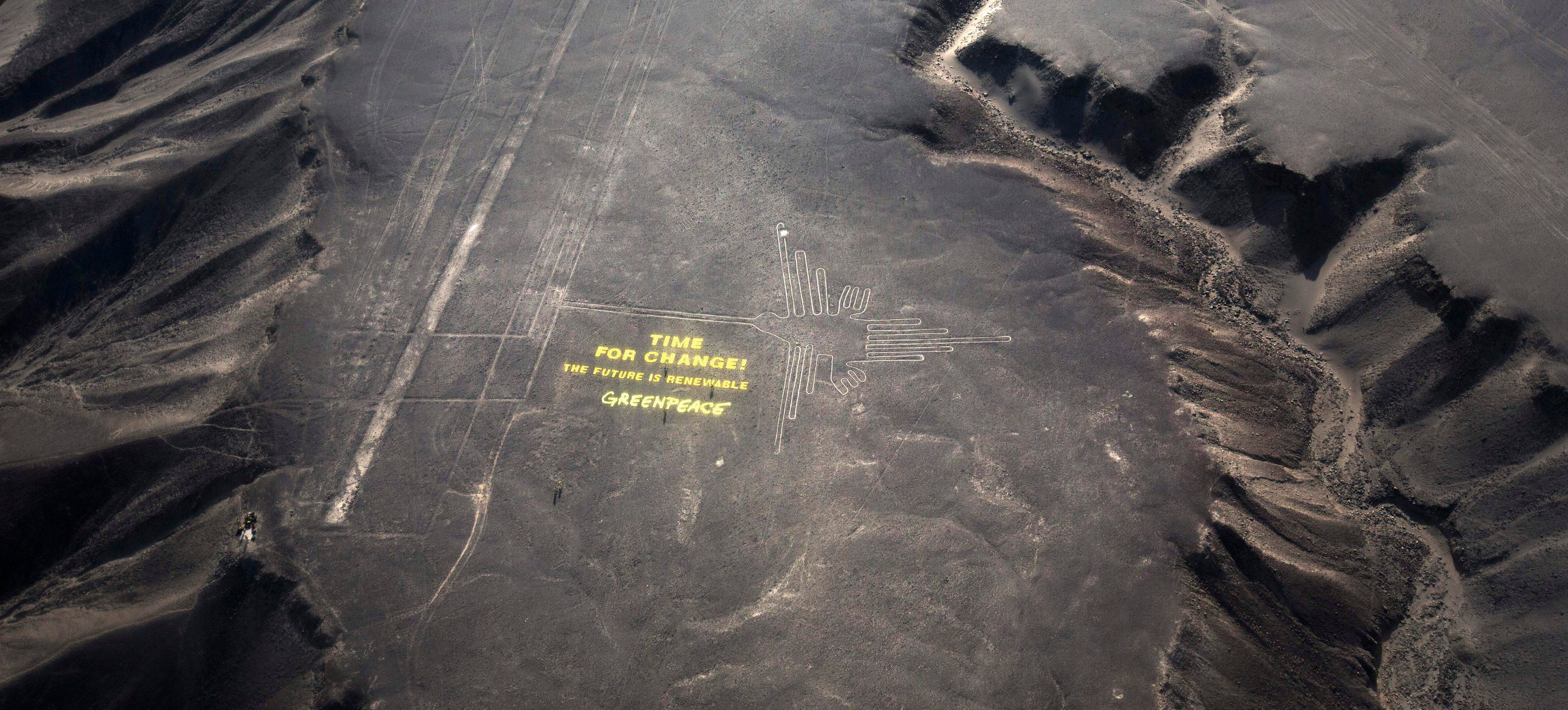
Image via AP
So over the weekend, the top trending story was the Greenpeace fiasco in the Peruvian Dessert. It’s important to understand why Greenpeace’s actions in Peru are such a big deal. I am sure this story will often be cited as an example of the careless and rather short sighted actions of Western NGOs. But as PCJ students, we are not here to focus on single events; we are here to ask the big questions.
Let me provide some context for those who are not familiar with the event or Greenpeace. Greenpeace was actually founded in Vancouver in 1971, in response to nuclear tests by the U.S. in Alaska. It is one of the largest and oldest activist groups in the world and has over 2.9 million members worldwide. So obviously, we can see that the actions of this organization are going to be relevant in the NGO/Activist world. Simply, in an attempt to get the attention of world leaders from the United Nations summit in Peru, 12 Greenpeace activists entered a restricted area of Peruvian dessert (the Nazca Lines), and placed a cloth sign on the ground. The Nazca Lines are considered a cultural heritage site, as well as an important geographic aesthetic. The activists created a trail and stepped all over the fragile dessert area, basically disrupting that part of the site with foot print impact. Was this the biggest mistake Greenpeace could make? The answer is YES, it was a huge mistake. An organization whose sole purpose it to fight for the preservation of such sites, calling itself the Rainbow Warriors (After a Cree Legend) literally trampled all over the delicate land. People are obviously involved in the planning and re-planning of this strategy; so the question is why was no thinking done? This is not the first time Greenpeace has gotten in trouble for acting before thinking (please research for more information).
But as PCJ students what are we to get out of this debacle? Here are some key questions that we should ask ourselves and discuss with others. Greenpeace obviously did not pay attention to the value of the land they were on and even if they did do their research, they seemed to not care. What does this mean for other NGOs and activist groups like Greenpeace? Are western NGOs of all types not the right groups to be entering countries and fighting for their causes? But then again, what about other NGOs like Free the Children or War Child Canada? Some NGOs are not activist groups; they are neutral groups present only to do their job, such as Doctors without Borders, a team of medical doctors who do not pursue an activist agenda.
On the flip side of this case, to what extent is the Peruvian government pursuing their own personal agenda; by attempting to prosecute the 12 Greenpeace members (effectively scaring other activists)? We’ve heard a lot of backlash from the President and their representatives but why are they so outspoken on this case? It would be naïve to assume it is merely because of their strong attachment to heritage sites. Of course the people of Peru have every right to be outraged by such callous disregard for their land and heritage. But stop to consider that Greenpeace is an organization that has been pestering the government to change their environmental policies. Can we say that this tense relationship between the government and Greenpeace has a role to play in their fury filled reaction?
To end off, do I think this means the end of Greenpeace or its credibility? Definitely not, but I do not think that this sort of stupidity has given us some serious things to think about. As students of PCJ it is our responsibility to engage with these questions and issues. We have to be critical of do-gooders; we have a responsibility to always search for the truth. But one thing I want to stress is that we need not come to simple conclusions. If you read an article on Greenpeace and come to the conclusion that all NGOs are terrible, then you are thinking too narrowly. The world is too complex for simple solutions and judgements; we must learn to think complexly in order to fish for possible remedies to gargantuan issues.
Last two questions I promise; how do you change a city, a country and a world without expressing your ideals and values onto other people? Is it possible? Where do we draw the line between infringement on cultural rights and these Western NGOs knowing what is “ good” for developing countries?